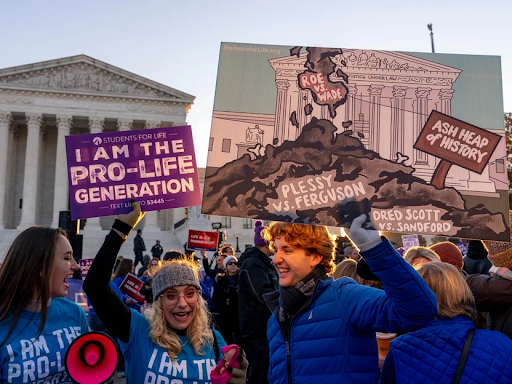Overturn Roe

Image courtesy of Andrew Harnik, Associated Press
By Fabrizio Gowdy
This past week, the Supreme Court of The United States heard oral arguments in Dobbs v. Jackson Women’s Health Organization, a case challenging the constitutionality of Mississippi’s 2018 law banning abortions at 15-weeks. Lower courts ruled that the ban violated the precedent set by Roe v. Wade, but Mississippi has appealed and is asking the Supreme Court to revisit whether pre-viability restrictions on elective abortion are unconstitutional. As Americans and Catholics, we should pray that the justices find the courage and moral fortitude to finally overturn Roe v. Wade.
The legal case for a constituionally protected right to abortion requires us to interpret the implied privacy rights of the 14th Ammendment as covering a right to abortion. As a libertarian, I also believe personal privacy rights are a cherished American tradition enshrined in our Constitution and founding documents. However, the right to privacy does not cover violations of other people’s rights, such as depriving an individual of their life: one cannot commit murder in the privacy of his own home and claim it is protected by the implied privacy rights of the 14th Ammendment.
Justice Harry Blackmun’s majority decision in Roe, built off precedent set by previous Supreme Court decisions, is rooted in implied privacy rights like Skinner v. Oklahoma and Eisenstadt v. Baird. An amicus brief filed by the United States Council of Catholic Bishops in July 2021 does an excellent job of explaining the important distinction between these cases and Roe v. Wade.
“Skinner and Eisenstadt concerned laws in which the government prevented people from having children or interfered with the decision not to become pregnant, which is different from protecting an unborn child in an established pregnancy.” It takes an unfounded legal leap to equate a right to prevent pregnancy from occurring to a right to end the pregnancy after it has begun. Privacy rights cannot be used to shield abortion, a trampling of the most basic of rights: the right to life.
While the justices are bound by the Constitution and must legally justify a constitutional right to abortion, the moral debate is far simpler. The inescapable biological reality that all pro-choice arguments ultimately run into is that life begins at the moment of conception. You do not have to be a devout Catholic to accept the scientific consensus. The moment the sperm fertilizes the egg, a distinct human life form containing unique genetic material has been created. No matter how small or undeveloped, this is a person. It is up to society to decide if we value the lives of the unborn, but whether fetuses are humans is not a debate.
Since abortion ends innocent human lives and cannot be morally justified, pro-choicers often resort to practical arguments to muddy the waters. They cite cases of rape and incest to justify all abortions, despite the fact that such cases are exceedingly rare. The answer to rape is to execute rapists, not innocent unborn children. American law is not governed by Hammurabi’s code; we do not punish the son for the sins of the father.
Pro-choice advocates also muddy the waters by calling pro-life advocates “pro-birth,” alleging those who oppose abortion do not care about the well-being of the millions of children already living in poverty. They argue that it would be better for a fetus to be aborted than to be born into a life of poverty and crime. This argument reeks of eugenics and harkens back to the racist motives of early abortion-rights proponents. It also assumes that most people who currently live a low quality of life would rather have never been born, which seems dubious considering the majority of people below the poverty line do not appear to be suicidal.
The solution is not to kill more babies before they are born into socioeconomic hardship; it is to build a pro-life culture by funding crisis pregnancy centers and adoption agencies. America seems to have no issue spending money as of late, and those who are most fervently pro-abortion also favor spending the most money. Let’s take the $500 million the federal government gives to Planned Parenthood annually and use that funding to support the needs of pregnant mothers rather than encouraging them have abortions.
As a nation, we are capable of building a pro-life future, but it begins with overturning Roe. We cannot have an invented right to abortion enshrined in legal precedent. Roe was not simply decided incorrectly; it was egregiously wrong. It is one of the worst Supreme Court decisions in American history and has been likened to other grossly wrong decisions like Dred Scott v. Sanford and Plessy v. Ferguson. Some argue Roe should be left in place because it is a forty-eight year-old decision, and the principle of Stare Decisis dictates we should respect long standing precedent. If Chief Justice Earl Warren had followed this logic in 1954, he would have upheld Plessy, a fifty-eight year-old decision. Fortunately, he did not, and the court overturned a legally and morally wrong precedent, paving the way for integration. We are now at a similar moment in history; the time has come to overturn the great moral evil that is Roe v. Wade and pave the way for a pro-life culture.





